Questions with Answers, Solution | Algebra | Chapter 3 | 8th Maths - Exercise 3.6 (Linear Equation in One Variable) | 8th Maths : Chapter 3 : Algebra
Chapter: 8th Maths : Chapter 3 : Algebra
Exercise 3.6 (Linear Equation in One Variable)
Exercise
3.6
1. Fill in the blanks
(i) The value
of x in the equation x + 5 = 12 is --------------------
[Answer: 7]
Solution:
Given, x + 5 = 12
x = 12 − 5 = 7 (by transposition method)
Value of x is 7
(ii) The
value of y in the equation y − 9 = ( −5) + 7 is --------------------
[Answer: 11]
Solution:
Given, y − 9 = (−5) + 7
y − 9 = 7 − 5 (re−arranging)
y − 9 = 2
∴ y = 2 + 9 = 11 (by transposition
method)
(iii) The
value of m in the equation 8m = 56 is--------------------
[Answer: 7]
Solution:
Given, 8m = 56
Divided by 8 on both sides
[ 8 × m ] / 8 = 56
/ 8
∴ m = 7
(iv) The
value of p in the equation 2p/3 = 10 is --------------------
[Answer: 15]
Solution:
Given, 2p / 3 = 10
Multiplying by 3 on both sides,
[2p / 3] × 3 = 10 × 3
Dividing by 2 on both sides
2p / 2 = 30 / 2
∴ p = 15
(v) The linear
equation in one variable has -------------------- solution.
[Answer: one]
2. Say True or False.
(i) The shifting
of a number from one side of an equation to other is called transposition.
(ii) Linear
equation in one variable has only one variable with power 2.
[ correct statement : Linear equation in one variable has only one variable with power one ]
3. Match the following :
(a) x/2 = 10 : (i) x = 4
(b) 20= 6x – 4 : (ii) x = 1
(c) 2x – 5 = 3 – x : (iii) x =
20
(d) 7x – 4 – 8x = 20 : (iv) x = 8/3
(e) 4/11 − x = −7/11 : (v) x = –24
(A) (i),
(ii), (iv), (iii), (v)
(B) (iii),
(iv), (i), (ii), (v)
(C) (iii),
(i), (iv), (v), (ii)
(D) (iii),
(i), (v), (iv), (ii)
[Answer: (C) (iii), (i), (iv), (v), (ii)]
Solution:
a. x/2 = 10, multiplying by 2
on both sides, we get
[x / 2] × 2 = 10 × 2 ⇒ x = 20
b. 20 = 6x – 4 by
transposition ⇒ 20 + 4 = 6x
6x = 24 dividing by 6 on both sides,
6x / 6 = 24 / 6 ⇒ x = 4
c. 2x − 5 = 3 − x
By transposing the variable ‘x’, we get
2x − 5 + x = 3
by transposing − 5 to other side,
2x + x = 3 + 5
∴ 3x = 8 , 3x / 3 = 8 / 3
∴ x = 8 / 3
d. 7x − 4 − 8x = 20
by transposing − 4 to other side,
7x − 8x = 20 + 4
− x = 24
∴ x = − 24
e. 4/11 – x = −7 / 11
Transposing 4/11 to other side,
−x = [−7/11] [–4/11] = [−7 – 4] / 11 = −11/11 = −1
∴ − x = − 1 ⇒ x = 1
4. Find x and p 
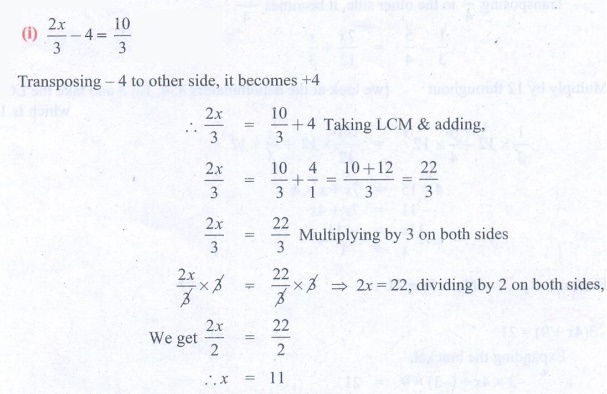
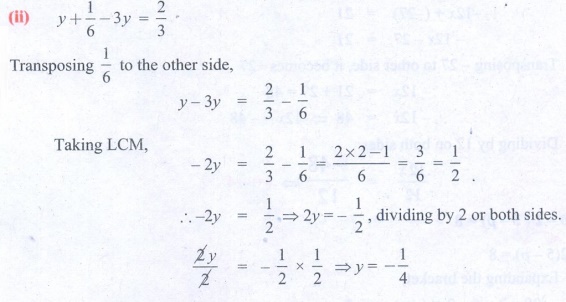
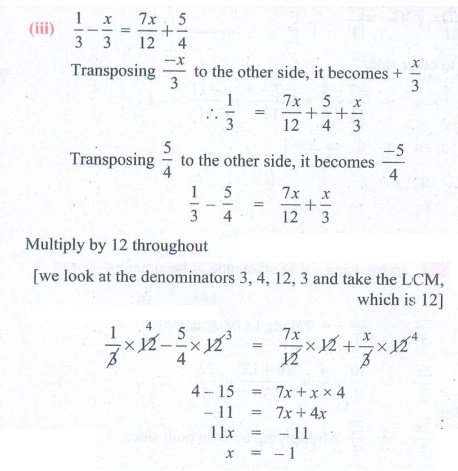
(i) 2x/3 − 4 = 10/3 (ii) y + 1/6 − 3y = 2/3 (iii)
1/3 – x/3 = 7x/12 + 5/4
(i) 2x/3 – 4 = 10/3
Solution:
Transposing − 4 to other side, it becomes + 4
∴ 2x / 3 = 10/3 + 4 Taking LCM & adding,
2x/3 = 10/3 + 4/1 = [10 + 12] / 3 = 22 / 3
2x/3 = 22/3 Multiplying by 3 on
both sides
[2x/3] × 3 = [22/3] × 3 ⇒ 2x = 22, dividing by 2 on both sides,
We get 2x / 2 = 22 / 2
∴ x = 11
(ii) y + 1/6 – 3y = 2/3
Solution:
Transposing 1/6 to other side,
y – 3y = 2/3 – 1/6
Taking LCM,
−2y = 2/3 – 1/6 = [2 × 2 – 1] / 6 = 3/6 = 1/2
∴ −2y = 1/2 ⇒ 2y = −1/2, dividing by 2 or
both sides.
2y / 2 = –1/2 × 1/2
⇒ y = −1/4
(iii) 1/3 – x/3 = 7x/12 + 5/4
Transposing −x/3 to other side, it becomes + x/3
∴ 1/3 = 7x/12 + 5/4 + x/3
Transposing 5/4 to other side,
it becomes −5/4
1/3 – 5/4 = 7x/12 + x/3
Multiply by 12 throughout [we look at the denominators 3, 4, 12,
3 and take the LCM, which is 12]
[ (1/3) × 12 ] – [ (5/4) × 12 ] = [ 7x/12 × 12 ] + [ x/3
× 12 ]
4 − 15 = 7x + x × 4
−11 = 7x + 4x
11x = − 11
x = − 1
5. Find x (i) –3(4x + 9) = 21 (ii)
20 – 2 ( 5 – p) = 8 (iii) (7x – 5) –
4(2 + 5x) = 10(2 – x)
(i) −3(4x + 9) = 21
Solution:
− 3(4x + 9) = 21
Expanding the bracket,

−3 × 4x + (−3) × 9 = 21
∴ −12x + (−27) = 21
−12x − 27 = 21
Transposing − 27 to other side, it becomes +27
− 12x = 21 + 27 = 48
∴ −12x = 48 ⇒
12x = − 48
Dividing by 12 on both sides
12x / 12 = − 48 / 12 ⇒
x = − 4
(ii) 20 − 2 ( 5 − p) = 8
Solution:
20 − 2(5 − p) = 8
Expanding the bracket,

20 − 2 × 5 − 2 × (−p) = 8
20 − 10 + 2p = 8 ( −2 × –p =
2p)
10 + 2p = 8 transposing 10 to other side,
2p = 8 – 10 = − 2
∴ 2p = − 2 ∴ p = − 1
(iii) (7x − 5) − 4(2 + 5x)
= 10(2 − x)
Solution:
(7x − 5) − 4(2 + 5x) = 10(2 − x)

Expanding the brackets,
7x – 5 − 4 × 2 − 4 × 5x = 10 × 2 + 10 × (− x)
7x − 5 − 8 − 20x = 20 − 10x
7x – 13 − 20x = 20 − 10x
Transposing 10x & − 13, we get
7x − 13 − 20x + 10x = 20
7x − 20x + 10x = 20 +13, Simplifying,
−3x = 33
∴ 3x = −33
x = −33 / 3 = − 11
x = −11
6. Find x and m 
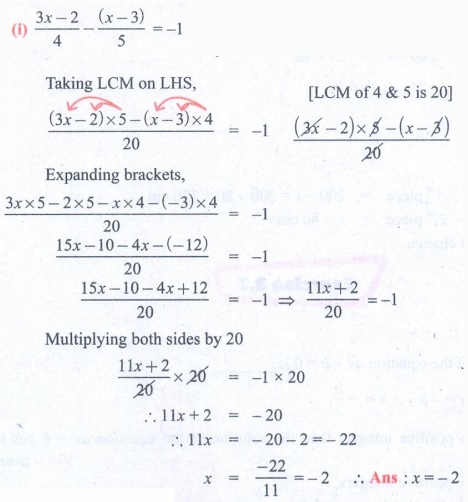
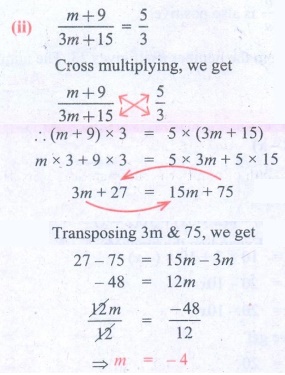
(i) (3x−2)/4 − (x−3)/5 = −1 (ii) (m + 9) /
(3m + 15) = 5/3
(i) [(3x – 2) / 4] – [(x − 3) / 5] = −1
Solution:
Taking LCM on LHS,
[ (3x − 2) × 5 − (x − 3) × 4 ] / 20 = −1
Expanding brackets,
[ 3x × 5 – 2 × 5 – x × 4 − (−3) × 4 ] / 20 = −1
[ 15x − 10 − 4x − (−12) ] / 20 = − 1
[ 15x − 10 − 4x +12 ] / 20 = −1 ⇒ [ 11x + 2 ] / 20 = −l
Multiplying both sides by 20
[(11x + 2) / 20] × 20 = −l × 20
∴ 11x + 2 = − 20
∴ 11x = − 20 – 2 = −
22
x
= −22/11 = − 2
∴ Answer : x = − 2
(ii) [ m + 9 ] / [ 3m + 15 ] = 5/3
Cross multiplying, we get
[m + 9 ] / [3m + 15] cross over [5 / 3]
(m + 9) × 3 = 5 × (3m + 15)
m × 3 + 9 × 3 = 5 × 3m + 5 × 15
3m + 27 = 15m + 75 Transporting 3m
& 75, we get
27 − 75 = 15m − 3m
−48 = 12m
12m / 12 = − 48 /
12
⇒ m = − 4
Answer:
Exercise 3.6
1. (i) x = 7 (ii) y = 11 (iii) m = 7 (iv) p = 15 (v) One
2. (i) True (ii) False
3. (c) (iii),(i), (iv),
(v), (ii)
4. (i) x = 11 (ii) y = 1/-4 (iii) x = −1
5. (i) x = −4 (ii) p = −1 (iii) x = −11
6. (i) x = −2 (ii) m = −4